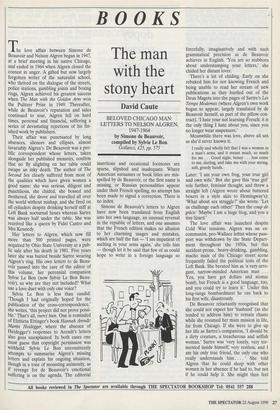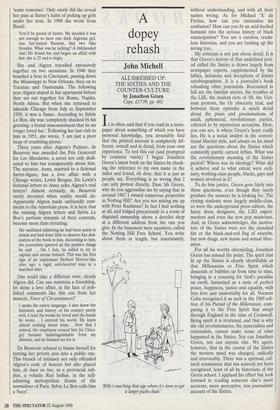BOOKS
The man with the stony heart
David Caute
BELOVED CHICAGO MAN: LE1 ERS TO NELSON ALGREN, 1947-1964 by Simone de Beauvoir, compiled by Sylvie Le Bon Gollancz, f25, pp. 575 The love affair between Simone de Beauvoir and Nelson Algren began in 1947, at a brief meeting in his native Chicago, and ended in 1964 when Algren closed the contest in anger. A gifted but now largely forgotten writer of the naturalist school, who thrived on the dialogue of the streets, police stations, gambling joints and boxing rings, Algren achieved his greatest success when The Man with the Golden Arm won the Pulitzer Prize in 1949. Thereafter, while de Beauvoir's reputation and sales continued to soar, Algren fell on hard times, personal and financial, suffering a series of devastating rejections of his fin- ished work by publishers.
Their affair was punctuated by long absences, silences and ellipses, almost invariably Algren's. De Beauvoir was a pro- lific correspondent whose letters, taken alongside her published memoirs, confirm that no fly alighting on her table could escape an inky death. The author of The Second Sex clearly suffered from most of the qualities which have given women a good name: she was serious, diligent and punctilious, she chided, she bossed and mothered, she drove and travelled all over the world without mishap, and she fired on all cylinders despite drinking herself stiff at Left Bank nocturnal hours whereas Sartre was always half under the table. She was received like a queen by Fidel Castro and Mrs Kennedy.
Her letters to Algren, which now fill more than 500 printed pages, were acquired by Ohio State University at a pub- lic sale after his death in 1981. Five years later she was buried beside Sartre wearing Algren's ring. His own letters to de Beau- voir passed into the care of the editor of this volume, her perennial companion Sylvie Le Bon (now Sylvie Le Bon Beau- voir), so why are they not included? What use a love duet with only one voice?
Sylvie Le Bon is less than candid: `Though I had originally hoped for the publication of the cross-correspondence,' she writes, 'this project did not prove possi- ble.' That's all, merci bien. One is reminded of Elzbieta Ettinger's book Hannah Arendt/ Martin Heidegger, where the absence of Heidegger's responses to Arendt's letters also goes unexplained. In both cases one must guess that copyright permission was withheld. Sylvie Le Bon intermittently attempts to summarise Algren's missing letters and explain his ongoing situation, though in a tone of mounting animosity, as if revenge for de Beauvoir's emotional suffering is on the agenda. The editorial insertions and occasional footnotes are sparse, slipshod and inadequate. Where American surnames or book titles are mis- spelled by de Beauvoir, or the first name is missing, or Russian personalities appear under their French spelling, no attempt has been made to signal a correction. There is no index.
Simone de Beauvoir's letters to Algren have now been translated from English into her own language, an unusual reversal in the republic of letters, and one assumes that the French edition makes no allusion to her charming usages and mistakes, which are half the fun — 'I am impatient of melting in your arms again,' she tells him — though let it be said that few of us could hope to write in a foreign language so forcefully, imaginatively and with such grammatical precision as de Beauvoir achieves in English. 'You are so stubborn about understamping your letters,' she chided her distant lover.
There's a lot of chiding. Early on she rebuked him for not knowing French and being unable to read her stream of new publications as they hurtled out of the Deux Magots into the pages of Sartre's Les Temps Modemes (where Algren's own work began to appear, largely translated by de Beauvoir herself, as part of the pillow con- tract). 'I hate your not learning French; it is the only thing I hate about you, since you no longer wear suspensers.'
Meanwhile there was love, above all sex as she'd never known it.
I really and wholly felt that I was a woman in a man's arms, and it meant much, so much for me . . . Good night, honey . . . Just come to me, darling, and take me with your strong, soft, greedy hands.
Later: 'I am your own frog, your true girl and own wife.' But she gave this 'true girl' role further, feminist thought, and threw a straight left (Algren wrote about battered boxers in a style akin to Hemingway's): `What about sex struggle?' she wrote. 'Let us challenge each other!' Then the coup de grace: 'Maybe I am a huge frog, and you a tiny lizard.'
The love affair was launched despite Cold War tensions. Algren was an ex- communist, pro-Wallace leftist whose pass- port was withdrawn by the State Depart- ment throughout the 1950s, but this accident-prone, heavy-drinking, gambling, macho male of the Chicago street scene frequently failed the political tests of the Left Bank. She berated him as 'a very arro- gant, narrow-minded American man . . . Yea, you have got dollars and atomic bomb, but French is a good language, too, and you could try to learn it.' Under this long-range bombardment he ran back to his first wife, disastrously.
De Beauvoir reluctantly recognised that she could not expect her 'husband' (as she tended to address him) to remain chaste while she resumed her main mission in life, far from Chicago. If she were to give up her life as Sartre's companion, 'I should be a dirty creature, a treacherous and selfish woman.' Sartre was 'very lonely, very tor- mented inside himself, very restless, and I am his only true friend, the only one who really understands him . . . . ' She told Algren that he could sleep with other women in her absence if he had to, but not if he could help it. She might then feel `some remorses'. Only rarely did she reveal her pain at Sartre's habit of picking up girls under her nose. In 1960 she wrote from Brazil:
You'll be proud of Sartre. He decided it was not enough to have one dark Algerian girl, one fair-haired Russian, and two fake blondes. What was he lacking? A red-headed one! He found her and began an affair with her: she is 25 and a virgin.
She and Algren travelled extensively together on two occasions. In 1948 they boarded a boat in Cincinnati, passing down the Mississippi to New Orleans, then on to Yucatan and Guatemala. The following year Algren stayed in her apartment before they set out together for Rome, Naples, North Africa. But when she returned to lakeside Chicago from July to September 1950, it was a fiasco. According to Sylvie Le Bon, she was 'completely shocked by his greeting: a brutal announcement that he no longer loved her.' Following her last visit to him in 1951, she wrote, 'I am just a poor heap of crumbling pieces.'
Three years after Algren's Pulitzer, de Beauvoir was awarded the Prix Goncourt for Les Mandarins, a novel not only dedi- cated to him but transparently about him. The narrator, Anne, married to a fictional Sartre-figure, has a love affair with a Chicago writer, Lewis Brogan. Do Lewis's fictional letters to Anne echo Algren's real letters? Almost certainly; de Beauvoir rarely invented when reality would do. Apparently Algren made unfriendly com- ments to the American press. It is here that the missing Algren letters and Sylvie Le Bon's partisan synopsis of their contents, become more than irritating:
He vacillated admitting he had been quick to attack and had done little to deserve her ded- ication of the book to him. According to him, the journalists ignored all the positive things he said . . . On 1 July, he called to try to explain and excuse himself. This was the first sign of an unpleasant Herbert Hoover-like alter ego: a rigid, cold-hearted man in a starched shirt.
One could take a different view; clearly Algren did. Can one maintain a friendship, let alone a love affair, in the face of pub- lished comments like this one from her memoir, Force of Circumstances?
I spoke his native language. I also knew the literature and history of his country pretty well, I read the books he loved and the books he wrote. . . I entered his world. He knew almost nothing about mine. . . Now that I existed, the emptiness around him [in Chica- go] became indistinguishable from my absence, and he blamed me for it.
De Beauvoir refused to blame herself for turning her private pen into a public one. This breach of intimacy not only offended Algren's code of honour but also placed him, de haut en bas, as a provincial sub- plot, a volatile Red Indian, in the self- admiring metropolitan drama of the normaliens of Paris. Sylvie Le Bon calls him a 'boor'.

























































 Previous page
Previous page